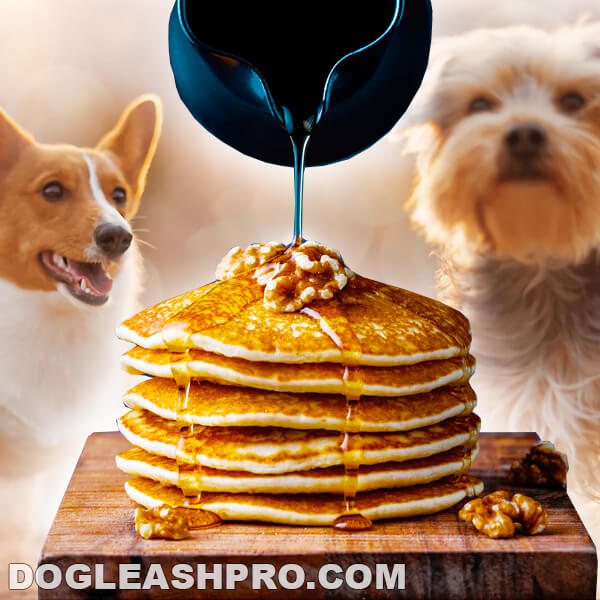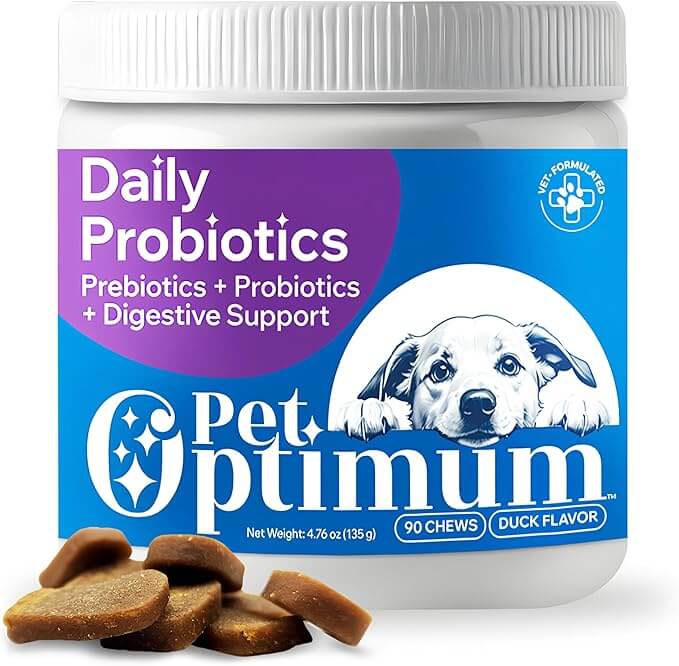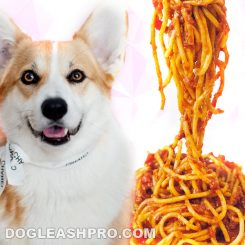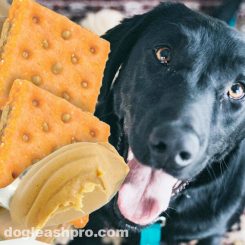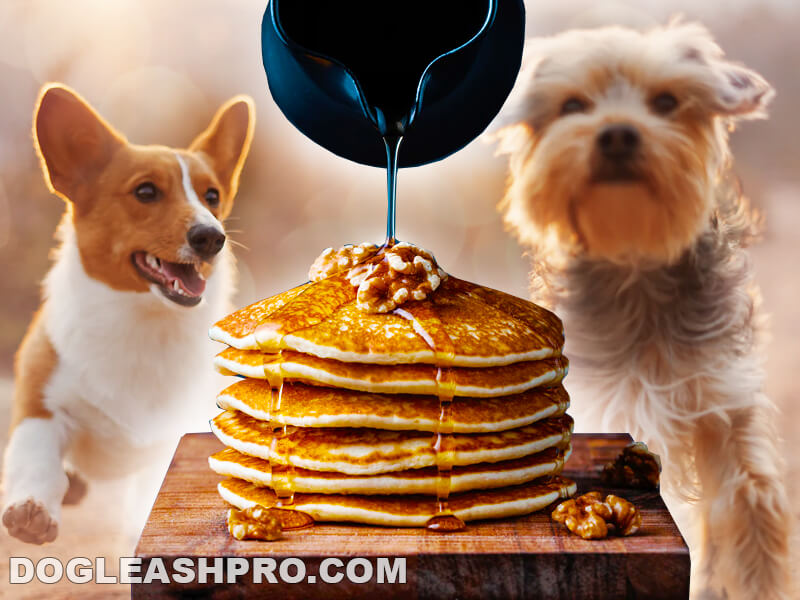
If you’re having strawberry jam Pancakes, chocolate Pancakes, or blueberry Pancakes, your dogs probably want some too. But before you offer some of that Pancake to your furry friend, you’ll want to read this first. We’ll discuss which Pancake ingredients or added toppings may not be safe for dogs. Let’s get to it!
Can dogs eat Pancakes? Yes, dogs can eat plain Pancakes in moderation, but be sure your dogs are not allergic to wheat or have sensitivities to grain. Since Pancakes are high in carbs and fats, they are not the healthiest food or treat to offer your dog. If you put toppings on your Pancakes, there are some that may be harmful to dogs.
Table of Contents
Can dogs have Pancakes?
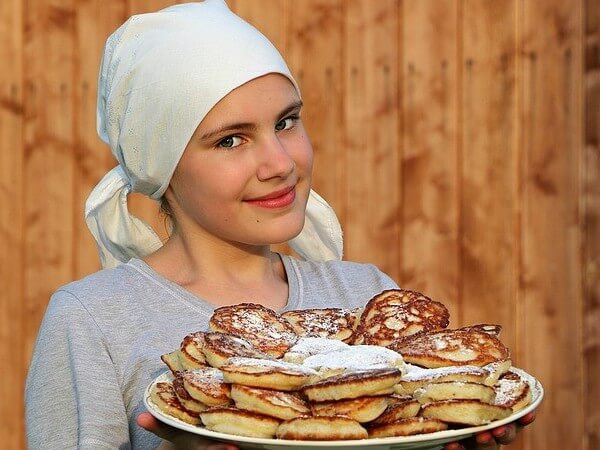
Dogs can have Pancakes if the ingredients in the Pancakes are not toxic or harmful to dogs. To find out if your canine friends can have Pancakes, it’s best to take a look at the main ingredients used to make Pancakes first.
Ingredients in Pancakes
- Flour.
- Eggs.
- Sugar.
- Salt.
- Baking powder.
- Baking soda.
- Butter.
- Milk.
Are Pancakes bad for dogs?
Pancakes are bad for dogs if they include ingredients that are toxic or harmful to dogs. Let’s go over the ingredients in Pancakes that may be dangerous to dogs.
Chocolate in Pancake is toxic to dogs
Many people love to add chocolate chunks to their Pancakes, but chocolate is extremely toxic to dogs. That’s because chocolate contains a chemical called theobromine as well as caffeine, both of which our furry friends are not able to metabolize effectively and this can lead to severe illness in dogs.
Did you know that both caffeine and theobromine can be used as a muscle relaxant, blood vessel dilator, heart stimulant, and diuretic? When dogs accidentally consume chocolate from the Pancakes, they can get sick from the amount of sugar and fats in the chocolate. If your pooch has sensitive stomachs, they may get pancreatitis.
Here are some of the signs and symptoms of chocolate poisoning if your pooch accidentally ate a chocolate flavored Pancake:
- Diarrhea.
- Vomiting.
- Extreme thirst leading to frequent urination.
- Increase heartbeat or heart rate.
- Panting.
- Restlessness.
- Muscle tremors (in severe cases).
- Seizures (in severe cases).
- Heart failure (in severe cases).
If you notice any of these signs or symptoms, make sure to contact your dog’s vet immediately as this requires immediate medical attention.
Raisins in Pancake is also toxic to dogs
Raisins are also harmful to dogs because they can cause kidney failure in dogs. Many studies speculate that the raisin toxicity may be due to the salicylate drug or mycotoxin found in grapes. Salicylate drug can lead to a decrease in blood flow to the dog’s kidney, which is why it can cause kidney failure in dogs. Some research also speculates that it may be the tartaric acid in grapes that may be harmful to dogs.
Signs and symptoms of raisin toxicity include:
- Vomiting.
- Diarrhea.
- Loss of appetite.
- Lethargy.
- Acute kidney damage (in severe cases) can lead to nausea, abdominal pain, extreme thirst, and frequent urination, as well as uremic (ammonia odor) breath.
Make sure to consult your vet right away. Your vet may ask you to bring your pooch in for examination or check-up so that he could be treated right away. The treatment should help block the absorption of the raisin toxins and minimize or prevent further damage to the dog’s kidneys.
If you plan on feeding your canine family member a little bit of Pancake, make sure to keep it plain and simple with no added flavor or flavoring.
Flour is harmful to dogs that are sensitive to gluten or have wheat allergies
The flour used in Pancakes contains both protein and starch. When the flour is wet with water, milk, or eggs, the glutenin protein becomes active. This helps form the structure of the Pancakes and gives the Pancake its chewy and fluffy texture.
So if your furry family member is sensitive to gluten, it’s best to avoid feeding them Pancakes.
Signs of gluten intolerance in dogs include the following:
- Diarrhea and vomiting. If you know your pup has coeliac disease, avoid feeding them Pancakes. The gluten in the flour will harm the dog’s gut. As a result, the dog will try to get rid of the gluten food by vomiting or having diarrhea.
- Dermatitis. Your dog’s skin may become flaky and dry. He may experience itchiness and may scratch a lot leading to redness, hot spots, bumps, hair loss, and rashes.
- Dry coat. The coat is dry because the body is unable to absorb the nutrients.
- Weight loss. Your pup may be losing weight at a fast or unhealthy rate.
- Seizure (in severe cases) if your pooch is extremely allergic to gluten.
You may be interested in: Can Dogs Eat Crackers?
A lot of sugar in Pancakes is harmful to dogs
Generally, our furry friends do not need sugar in their diet. Dogs usually receive their sugar intake from complex carbohydrates from their regular meal. Due to this, there’s really no need to feed our pooch food, treats, or snack with sugar.
Sugar is one of the main ingredients used to make Pancakes. Let’s take a look at how much sugar is in a small, medium, and large Pancake:
- 1 small Pancake has 1 gram of sugar.
- 1 medium Pancake has 2 grams of sugar.
- 1 large Pancake has 5 grams of sugar.
As you can see, even feeding your pooch one small Pancake is 1 gram too much sugar for dogs.
When dogs regularly eat too much sugar, they are at risk of the following:
- Spike in blood pressure.
- Diabetes.
- Depression.
- Weight gain leading to canine obesity.
- Dental issues like cavities, enamel loss, and tooth decay.
- Hyperactivity.
- Easily agitated.
- Kidney infections.
- Urinary tract infections.
- Pancreatitis.
If you plan on feeding your pooch Pancake, make sure it is pet-friendly pancakes. Avoid adding any sugar to the Pancakes. Keep the Pancake sugar-free.
Fun Fact: Raw or refined sugar is bad for dogs, but what about sugar from Sugar Cane? Check out Can Dogs Eat Sugar Cane? to find out!
Too much salt in Pancakes is dangerous to dogs
Many people will add salt to their Pancakes so that it doesn’t taste bland. In fact, most Pancake mixes are high in salt.
Dogs usually do not require that much salt in their diet. A 33-pound dog only needs 100mg of salt each day and no more than that. Keep in mind that their regular dog food will already contain some salt and eating Pancakes with salt as one of the ingredients could tip their salt limit.
Too much salt intake could lead to sodium poisoning in dogs and they may experience the following symptoms:
- Vomiting.
- Diarrhea.
- Walking in a drunken manner.
- Extreme thirst.
- Frequent urination.
- Lethargy.
- Loss of appetite.
- A lot of fluid accumulates inside the body.
- Kidney failure or disease.
- Muscle tremors.
If you know that your pooch has an existing health condition like heart, liver, or kidney disease, avoid feeding them Pancakes if you know the Pancakes contain salt. Dogs with these health conditions require a very low sodium diet and are quite sensitive to salt.
Stick to pet-friendly pancakes that are salt-free if you want your pooch to have a little.
Fun Fact: Many human snacks like Pretzels are pretty salty. Check out Can Dogs Eat Pretzels? to find out if this snack is safe for doggy consumption.
Milk is harmful to dogs who are lactose-intolerant
Milk is usually added to make Pancakes, but they are dangerous to dogs that are lactose intolerant. Most adult dogs are lactose intolerant so they may have difficulty digesting milk.
If you know your K9 pals are lactose intolerant, avoid feeding them Pancakes. It can cause gastrointestinal upset in dogs. That’s because most adult dogs lack the lactase enzyme to break down the sugar found in milk called lactose.
When your dogs were puppies, they had an abundance of lactase enzyme which was used to break down their mother’s milk while nursing. As puppies weaned and start eating adult food, they produce less and less lactase in their body and ultimately becomes lactose intolerant.
Dogs that are lactose intolerant will experience the following if you feed them Pancakes that contain milk as one of the ingredients:
- Vomiting.
- Loose stools.
- Diarrhea.
- Bloating and constant gas.
- Abdominal pain.
Even if your pup is not lactose intolerant, it’s important to note that milk is high in natural sugars and fat. Too much sugar and fat can also lead to vomiting and diarrhea.
Are Pancakes good for dogs?

As you can see, Pancakes are only good for dogs in moderation and under the following circumstances:
- The ingredients are not harmful to your canine friends.
- Your dogs are not allergic to any of the ingredients in Pancakes.
Avoid feeding your dogs Pancakes if you know that it can be harmful to their health.
Can dogs have buttermilk?
Dogs can have buttermilk as it is lower in lactose than regular milk. Is buttermilk good for dogs? Buttermilk is a great source of probiotics for dogs because it contains good bacteria or live cultures that help ferment the sugars in buttermilk. Essentially, good bacteria in buttermilk helps in the digestion of lactose.
However, it’s important that dog owners give their canine friends buttermilk right from the carton. Heating up the buttermilk or cooking it can destroy the good bacteria.
Buttermilk also contains lactic acid bacteria, which is beneficial to the health of the dog’s gastrointestinal system.
If your furry family member is very highly sensitive to dairy products or is lactose intolerant, feel free to ask your vet first if buttermilk is safe before feeding it to your pooch.
If you’re concerned about dairy sensitivities or want a more consistent way to support your dog’s gut health, PetOptimum Probiotics for Dogs offers a gentle, lactose-free solution. Packed with live cultures and designed to support digestive health, these soft chews can help your pup thrive—giving them the comfort they deserve and giving you peace of mind.
Can puppies eat Pancakes?
No, puppies should not eat Pancakes since they are filled with sugar, salt, flour, and potential flavors that are toxic to dogs.
A puppy’s body hasn’t fully developed yet and eating Pancakes (even a little bit) with so much sugar can be extremely harmful to your puppy’s body and health and may even cause puppy diarrhea.
If you still want to feed your puppy Pancakes, we highly recommend that you give just one tiny piece to your pup and see if he is allergic to gluten or flour. If your puppy reacts in any way, avoid feeding them any more Pancakes.
Can dogs eat Pancakes with syrup?
No, dogs should not eat Pancakes with syrup. The syrup is basically sugar or sweet, which is not good for your dog’s health.
First, the Pancakes are packed full of carbs and fats which is unhealthy for dogs and can cause a host of health problems if consumed regularly. Second, consuming syrup with the Pancakes is adding insult to the injury. The combination of fats, carbs, and sugar is extremely harmful to dogs.
Keep Pancakes with syrup away from dogs at all costs.
Can dogs eat Pancake syrup?
Absolutely, not. Dogs should not eat Pancake syrup because it is sugar that dogs do not need. Is Pancake syrup good for dogs? No, Pancake syrup is high in sugar and this can cause a host of health problems in dogs such as weight gain, diabetes, dental issues, and even pancreatitis if consumed regularly and frequently.
So, can dogs eat Pancakes and syrup? No, don’t allow your dogs to eat Pancakes and syrup. Pancakes and syrup mean tons of carbs, fats, and sugar, all of which are bad for dogs.
Can dogs eat blueberry Pancakes?
Yes, dogs can eat blueberry Pancakes if the Pancakes are plain without any added sugar, salt, or other ingredients that are harmful to dogs and it is just blueberry.
Blueberries are a great fruit for dogs because they are packed full of antioxidants, fiber, and phytochemicals. The antioxidants prevent cell damage and fight against free radicals.
However, make sure your dogs do not have gluten allergies since one of the Pancakes’ main ingredients is flour.
Can dogs eat buckwheat Pancakes?
Yes, dogs can eat buckwheat Pancakes.
Buckwheat is actually very canine-friendly and it is a safe ingredient to use in Pancakes if you plan to give your dogs a bite or two. Here’s what you need to know about buckwheat:
- Low in calories.
- Rich in vitamins.
- Gluten-free which is great for dogs with sensitive stomachs.
Can dogs eat plain Pancakes?
Yes, dogs can eat plain Pancakes if they don’t have gluten allergies. Plain Pancakes are actually the best for dogs since there are no added flavoring that can potentially be dangerous to dogs.
However, even with plain Pancakes, make sure there’s not a lot of salt or sugar. Eating too much sugar can cause weight gain, diabetes, dental issues, and even pancreatitis. Consuming too much salt can cause sodium poisoning.
If you can and have the time, try making pet-friendly pancakes instead. Instead of flour, use amaranth flour instead and do not add in any sugar or salt as dogs do not need either of those.
Can dogs eat banana Pancakes?
Yes, dogs can eat banana Pancakes. Banana is a healthy fruit for dogs so if you’re making banana Pancakes, they are safe for dogs to eat. There are actually many different types of banana Pancakes. Some are made with flour and others are made without flour.
The best option would be to feed your dogs banana Pancakes without flour, especially if your canine friends are sensitive to gluten or have gluten allergies.
Be careful how many bananas you’re adding into the Pancakes if you’re planning to give your dogs some. If your pooch already had some fiber intake from his regular dog food, feeding him banana Pancakes may increase their fiber intake which is not good for their digestion and can lead to upset stomach and diarrhea.
Can dogs eat protein Pancakes?
Yes, dogs can eat protein Pancakes as long as there are no harmful ingredients in them like xylitol. Here’s why.
Protein Pancakes are made with either protein powder or a popular brand called kodiak cakes. Some protein powders actually contain xylitol, which is toxic to dogs. If the protein powders do not contain toxic ingredients, then it is safe for dogs.
This is why taking a look at the ingredients is key before sharing any food with your canine friends.
Can dogs eat almond flour Pancakes?
Yes, dogs can eat almond flour Pancakes as long as they are not allergic to almonds. Before sharing almond flour Pancakes with your pooch, make sure they are not sensitive to almond products and only share a small amount of almond flour Pancakes with your pooch.
If you don’t know whether your dogs are allergic to almond flour, you can bring them to the vet for a check-up and see whether they have almond allergies.
Alternatively, as with any new food you’re introducing to your dogs, you can give a tiny bit of the almond flour Pancakes to your canines and see if they react to it. Before doing this, you should consult with your vet first. If your dogs react from eating this Pancake, avoid feeding them any more almond flour Pancakes.
Can dogs eat aunt jemima Pancakes?
Yes, dogs can eat aunt jemima Pancakes if they are plain. Aunt jemima Pancakes contain ingredients such as flour, oils, dry milk, and many more. If your pooch is allergic to the flour, then, avoid feeding them aunt jemima Pancakes.
Keep the Pancakes plain so don’t add any raisins or chocolate to the mix if you plan to feed a little bit of it to your dogs. A small amount is fine, don’t feed your dogs too many Pancakes in general.
Can dogs eat buttermilk Pancakes?
Yes, dogs can eat buttermilk Pancakes as long as they don’t contain any harmful ingredients we’ve mentioned above. Moderation is key here, a small bite or two as a rare treat is fine. Try not to feed your dogs buttermilk Pancakes regularly as this can cause a host of health problems in dogs.
Can dogs eat cinnamon Pancakes?
Yes, dogs can eat cinnamon Pancakes since cinnamon is a dog-friendly ingredient. However, make sure there are no added sugar or toxic ingredients like xylitol in the cinnamon Pancakes.
It’s best to feed your pooch one or two pieces of the cinnamon Pancakes as an occasional rare treat and try not to overfeed them.
Can dogs eat oatmeal Pancakes?
Yes, dogs can eat oatmeal Pancakes in moderation. Moderation is key because oatmeal is high in both calories and carbs. Eating too many carbs and calories can lead to weight gain and a host of other health issues.
Can dogs eat Pancake mix?
Yes, dogs can eat Pancake mix as long as the Pancake is plain without any added flavor or toppings that are harmful to dogs such as chocolate, raisins, or xylitol.
Again, moderation is key so avoid allowing your dog to overeat Pancake mix.
Handy Hint: If your dog is throwing up and vomiting and you have no idea why, take a closer look at their vomit. The color and texture of their vomit can tell you a lot about why your dog is not feeling well. Feel free to refer to our Dog Vomit Color Guide for more information.
Can dogs eat Pancakes with butter?
No, dogs should not eat Pancakes with butter. Butter is extremely high in fat which can cause weight gain. Consuming high-fat content can also lead to pancreatitis in dogs.
Be mindful not to feed your dogs Pancakes with butter, especially if you know your canine friends are more susceptible to inflamed pancreatitis.
Can dogs eat Pancakes with peanut butter?
No, dogs should not eat Pancakes with peanut butter. If your four-legged pooch is allergic to peanut butter, avoid giving them any Pancakes with peanut butter on them or in them.
Can dogs eat vanilla Pancakes?
No, dogs should not eat vanilla Pancakes. Most vanilla Pancakes contain vanilla extract which has alcohol. Our furry friends’ bodies are not able to break down alcohol so it’s best to keep vanilla Pancakes away from dogs.
So, can dogs eat Pancakes?
If you must feed your dogs Pancakes, make sure you’re only giving them a small piece or two and no more than that. Offering Pancakes to your pooch should be a rare occasional treat and not something you feed your dog every day.
Keep to plain Pancakes and even then, only allow your dog a bite or two. Instead of Pancakes, go with treats or snacks that are dog friendly instead.
DISCLAIMER: THIS WEBSITE DOES NOT PROVIDE MEDICAL ADVICE
The information, including but not limited to, text, graphics, images and other material contained on this website are for informational purposes only. No material on this site is intended to be a substitute for professional veterinary advice, diagnosis, or treatment. Always seek the advice of your veterinarian or other qualified health care provider with any questions you may have regarding dietary needs.
Resources:
https://en.wikipedia.org/wiki/Pancake
https://vcahospitals.com/know-your-pet/obesity-in-dogs

With over five years of specialized experience as an animal writer, my expertise lies in dog nutrition, health, behavior, grooming, and training. I am dedicated to delivering helpful and informative content that caters to the well-being of our furry friends. My primary goal is to empower pet owners with knowledge and ensure our canine companions thrive in health and happiness. In my free time, I love volunteering at local dog rescue centers.
